Parliament has passed a Rf12.7 billion (US$988 million) mid-term budget for 2010, seven per cent higher than the budget proposed by the government.
With the amendments made by the budget committee, additional funds will be allocated to restore civil servants’ salaries to their former levels and increase the budgets of independent institutions.
In his statement to parliament following voting on amendments, Finance Minister Ali Hashim said he fulfiled his legal duty by specifying how the deficit would be plugged in the Rf11.9 billion (US$926 million) budget originally submitted last month.
“But, since the honourable Majlis has so far not shown how the amounts it has added will be financed, I request that you state this before passing the budget,” he said, adding he could not bear responsibility for the economic consequences of an unmanageable deficit.
With the injection of over Rf800 million (US$62.2 million) to the budget by parliament, the deficit will grow to Rf5.4 billion (US$420 million), up from Rf4.6 billion (US$357 million).
Hashim warned that the budget deficit would exceed the limits acceptable to the International Monetary Fund (IMF), which has pledged US$92.5 million in financial assistance.
“This will create difficulties in obtaining the assistance pledged by the IMF, World Bank and the Asian Development Bank,” he said. “Moreover, if we move away from the economic principles acceptable to the IMF, it will become difficult to secure assistance from other financial institutions.”
Amendments
A total of 15 amendments were passed, including increasing subsidies for fishermen by Rf100 million and Rf50 million for farmers, requiring the government to submit an audit report of the National Social Protection Agency by March and another report providing details of the public sector investment programme (PSIP) projects by February.
Moreover, the projects will be subject to parliamentary approval, while the government will be required to submit a report on how it intends to solve disembarking difficulties in all inhabited islands by March.
Among the other amendments were reallocating Rf10 million out of a Rf100 education ministry budget item – earmarked for assistance for students’ exam fees – to build schools in the atolls; and increasing annual state benefits to people who have memorised the Quran from Rf500 to Rf2,000.
The most contentious amendment passed today was proposed by Inguraidhoo MP Hamdhoon Hameed to require parliamentary approval for projects under the public-private partnerships (PPP).
Under another amendment, the finance ministry has to settle unpaid electricity bills of government offices in the islands by February out of its contingency budget.
Fiscal framework
In his statement, the finance minister urged MPs to expedite the passage of the taxation legislation as it was crucial for generating revenue in a sustainable way.
“If the amounts proposed to increase the budgets of independent institutions are included, I believe expenditure has to be reduced in other areas of the state budget,” he said, adding it would otherwise lead to further growth of the budget deficit.
Hashim said the government was planning to make significant changes to the fiscal framework from 2011 onwards, such as setting a percentage for the budgets of institutions and replacing line item budgets with a programme budget.
PSIP vs PPP
It was not possible to include more projects in the public sector investment programme (PSIP) while maintaining the deficit at a rate acceptable to international organisations, Hashim said.
But, he added, some investments, such as a new jail, were included in the PSIP.
On the pay cuts for civil servants, Hashim said the government agreed to restore salaries to former levels once revenue reaches Rf7 billion.
The finance ministry supports restoring civil servants’ salaries and discussions will take place with the Civil Service Commission, he said.
He added the pay cuts were necessary after projected revenue for 2009 did not materialise due to the impact of the global recession on the Maldivian economy.
Printing money to plug the ballooning deficit, he continued, has led to serious adverse effects on the domestic economy.
On the Rf4 million in subsidies for private media recommended by the committee, Hashim said he believed the corporatised Maldivian National Broadcasting Corporation (MNCB) should be eligible as it would no longer receive state subsidies.
During the debate today, MPs of the opposition Dhivehi Rayyithunge Party-People’s Alliance criticised the government for reducing almost Rf1 billion from expenditure on education and healthcare as well as for the relatively small amount designated for PSIP.
Defending the budget, MPs of the ruling Maldivian Democratic Party reiterated the government’s policy of carrying out development projects under public-private partnerships, arguing that unsustainable deficit spending for the PSIP had not delivered infrastructure for the islands.
MDP MPs criticised the budget committee for not including the “professional opinion” on the budget by the Maldives Monetary Authority (MMA), which acknowledged that it was formulated to curb inflation and pay down the large government debt.
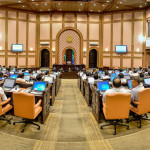
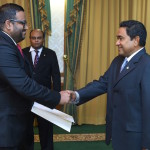
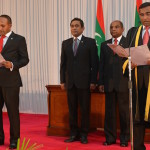
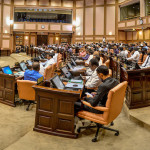
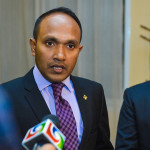
The current administration came to power because the people believed and accepted the promises it made to the public. The budget is there to finance to deliver those promises. For the government to deliver its promises, the government has the right to decide where the funds should go. The parliament could not make the government accountable if they meddle in the affairs of the executive. The passing of the budget is more a ceremonial activity. If the majilis moves/increases/decreases funds in the budget, then the Majilis members are directly meddling with the executive's role. The members of the budget committee are not financial experts to sit and decide how the money should be spent. Most of them are not even fit to be sitting and making decisions for a country. I would urge the government to follow the budget that they proposed to the majilis, as at the end of the day it is the government that has to be accountable to deliver on its promises.
I agree totally with the comments made by Aishath. I wonder if the Majlis members know what their role is according to the Constitution. If they don't may be they should just resign and wait their turn to become the President in the next elections.
Perhaps it's time for the constituents to call for the resignation of their MPs, if they don't understand what their roles are!
We should not allow this to go on! Common people, let's all unite and stand up for our constitutional rights!!
Take the Majlis to Supreme Court - irresponsible and shameless parliamentarians we have - really shame on you. Do you people even know the basics of economics? How can the Govenrment be held accountable if these useless 2 year old children are just viciously trying to ensure the government does not deliver? How ignorant and how long will the people remain quite on this?
Before people start agreeing and commenting all this nonsense and talk about the constitution, I would suggest them to first read it and then refer to it.
Article 96 of the constitution states the ambit of the parliament with regard to the 'budget'
"Article 96 (b) specifically states that the parliament has the power to amend and bring changes to the budget"
If someone believes that the parliament is a rubber stamping high paying good for nothing institution, then you must have been born to a time when they dint have a parliament.
Firstly there are three arms of the state, that is the executive, the parliament and the judiciary. A budget proposed by the executive that neglects the parliament and the judiciary should be amended.
In presidential systems the budget is made in consultation with the different arms of the state and is drafted in the budget committee rather than by one retarded finance minister whose sole budget is to float his party members salary.
I was around when there were around 350 political posts during former president maumoons government and everyone talked the amount of political posts, and now we have 600 + and if you can be a hypocrite then thats fine but not everyone has to be.
Following the 2004 tsunami, the Government of Maldives, in a letter dated February 21, 2005, requested the International Monetary Fund “to assist the Maldives in meeting its immediate financing needs, without seriously depleting its external reserves”. The government stated that it would “continue to collaborate with the Fund in finding solutions to the country’s economic challenges. We have also requested technical assistance in the areas of expenditure control and tax policy, with the aim of improving budget management and broadening the revenue base.”
They also stated that “the government recognizes the need to modify the budget to help finance expenditure on disaster relief and to redress the imbalances created by shortfalls in revenue from tourism. Therefore, the government intends to take a number of measures. We will:
• Reallocate capital expenditure to reconstruction needs by deferring all capital projects in the domestic public sector investment program on which work has not already begun, and reduce planned expenditures on machinery and equipment and vehicles.
• Reduce planned increases in civil service manpower, to contain the increase in expenditure on wages and allowances. The government will also not approve any further wage increase in 2005.
• Reduce budget allocations for nonwage current expenditure unrelated to disaster relief or reconstruction. Specifically, the government will discontinue or delay some new spending on transportation and utilities, cut back foreign travel, and reduce spending on IT and office supplies.
• Refrain from granting waivers of import duties for reconstruction of tourist resorts.
“Looking beyond 2005, the government remains committed to macroeconomic stability and policies which will ensure fiscal and external debt sustainability. The government remains committed to the exchange rate peg to the U.S. dollar, which has long provided a simple and transparent nominal anchor for the Maldives. To support the exchange rate peg while maintaining an adequate level of reserves, from 2006, we intend to return to a stance of limited borrowing or modest repayments to the MMA, financing remaining reconstruction spending from foreign grants and loans, or if these are not sufficient from savings elsewhere in the budget. We also intend to broaden the tax base by introducing a Business Profits tax, and to increase the autonomy of the MMA in the conduct of monetary policy. We will also exercise restraint in contracting new external debt. Following the disaster, there will be a need for new borrowing, but the government will aim to secure commitments for external support in the form of grants and highly concessional loans to the extent possible.”
http://www.imf.org/external/pubs/ft/scr/2005/cr05145.pdf
Consequently, on March 4, 2005, the IMF released a statement indicating that the Fund had “approved SDR 4.1 million (about US$ 6.3 million) in emergency assistance for natural disasters for the Maldives”, supporting the Maldives’ call for international assistance “in the form of grants or highly concessional loans from donors to help the Maldives get through the crisis” and welcoming “the government's preparedness to take fiscal adjustment measures as required to maintain macroeconomic stability”. http://www.imf.org/external/np/sec/pr/2005/pr0553.htm
Similarly, on December 4, 2009, the Fund released a statement that said that the Executive Board had “approved blended financing arrangements for Maldives amounting to a combined SDR 57.4 million (about US$92.5 million). The financing is designed to help smooth the country’s adjustment to the fallout from the global crisis and support the authorities’ strong policy program.” And that “the authorities’ program, while subject to considerable risks, is strong, comprehensive, and well-focused, and deserves strong support of the international community. If fully implemented, it will put the Maldivian economy back on a path of macroeconomic stability and set the conditions for sustained economic growth and poverty reduction,”.
http://www.imf.org/external/np/sec/pr/2009/pr09444
Meanwhile, in September 10, 2008, the Fund stated that “the main challenge for Maldives is to ensure that the broadly favorable growth prospects are not undermined by excessive fiscal spending and attendant macroeconomic instability.” And that “ensuring fiscal sustainability over the medium term will require revenue-enhancing reforms, including the introduction of corporate taxation, a broad-based sales tax, and an ad valorem tourism tax. They called on the authorities to press ahead with their plans to develop a realistic medium-term expenditure framework to prioritize spending within the available resource envelope.” http://www.imf.org/external/np/sec/pn/2008/pn08115.htm
Why quote the International Monetary Fund? Simply because they are the agency viewed by much of the world as the watchdog on macroeconomic issues, and the Fund’s willingness to commit resources based on their opinion of a country’s macro policies is an internationally accepted indicator of a nation’s policy credibility. This is often the lever that moves much of the international community to commit on financial assistance, as was very clearly witnessed in the aftermath of the tsunami.
The bottom line is, macroeconomic stability – ie, low inflationary growth, etc - is important for development. We could go on spending and grow, but if we do not live within our means, at the end of the day we become indebted and the money in our pockets means little because it buys the same amount of goods or less goods than before, and ultimately it is the poor that are affected even more. In an economy such as that of the Maldives, fiscal policy drives most of the macroeconomic variables. This is why it is imperative that we curtail fiscal deficits within certain indicative targets, ie, a certain percent of GDP. This is the hard reality which would hold regardless of which party is in power or what revenue instruments/expenditure details are being proposed. These are broad economic realities that policy makers and legislators whether they are in government, opposition or independent entities have to work within, in order to keep the Maldivian economy on a sustainable path.
A happy and peaceful new year to all.
While the Constitution gives the Parliament the right to amend the budget, it is the duty of every MP to vote in a responsible manner. Anyone who can't understand or know that we have to scale back on spending right now, shouldn't be in the Parliament making decisions to increase the budget deficit that will ultimately affect all of us. This isn't the time for MDP and DRP power play! If the MPs can't see beyond this, please do all of us and your constituency a favour and resign! Having said that, I think that the budget proposed by the Government was also too high in the first place! I applaud the Government's decisions to finally start the development of safety net mechanisms, but I strongly believe that it should be done in a much more responsible manner than just handing out cash to all the vulnerable groups! We do not want this country to be more of a welfare state than it already is! And there is obviously no point in having independent MPs in the Parliament who can't think outside the square of MDP and DRP power fights!!
It is a pity we have a non caring parliament!
Yes, some of our parliamentarians are only power crazy!
They only have eyes to see what is in the constitution that give them power!
Their eyes are blind to the realities of life!
They do not and cannot see 2nd hand jangiyas having been sold to their citizens as brand new!
They cannot see the coffers been washed clean leaving it nothing!
They cannot see or ask what happened to the shipping fleet that Maldives had in the 60s and 70s which at the time was a formidable fleet to be reckoned with! Today they are all a distant memory. They cannot see it being depleted like camphor!
It seems these DRP thugs in parliament are ready to do everything to destroy this country. IMF and World Bank approved the current budget as proposed and these thugs added another 800,000,000 to increase the debt level. Maldives is still one of the higly indebted countries in the world with debts exceeding GDP!!! And if we go on a spending spree and print money, inflation is going to lead to stagflation and finally the thugs will get what they want - destroying Maldives for they have enough property and money eslewhere. Hope these guys don's succeed. And may these guys rot in Hellfire forever!